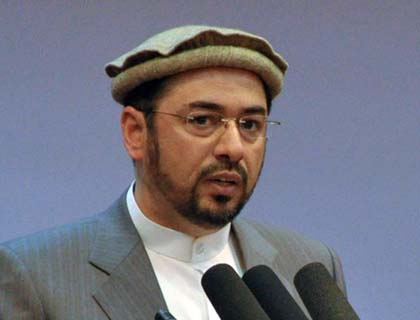KABUL - The Afghan High Peace Council (HPC) on Tuesday expressed its hope of bringing peace and security into Afghanistan by resuming the stalled peace process. The HPC Chairman, Salahuddin Rabbani, said that the failure in Qatar does not signify an end of the peace negotiations.
"The US-backed peace negotiation process has failed to yield any positive result, but HPC's effort to bring the Taliban on the negotiation table will continue," said Mr. Rabbani.
However, a number of Senators expressed frustration with the HPC, accusing it of incompetence in getting productive negotiations going with the Taliban and even dishonesty in its communication of the process to the Afghan people.
The Senators emphasized that people remain unaware of what initiatives and strategies the HPC has executed or plans to execute when it comes to the peace process.
They added that the HPC has been weak in its handling of the peace negotiation process and has failed in meeting basic expectations like getting the Taliban to sit down and negotiate with it.
"The peace council should be suspended as it failed to clarify its plans with regard to the restoration of peace in the country and has not been able to attain convincing results with regard to peace talks," said Senator Shahnaz Ghawsi.
Ahmad Zia Masood, the head of the National Front Party (NFP), strongly criticized the way peace negotiations have been handled. Masood urged the Afghan government to review its peace negotiation policy and try other ways to bring the Taliban on the negotiation table.
"The Taliban have always remained stern on their decision and made it clear that the group does not recognize the Afghan government as a negotiating party. Now, the government should restart the peace process by keeping an action plan ready," said Mr. Masood, head of the NFP.
In recent years, the Afghan government has used all the available options to get the Taliban on the negotiation table. The government even went to the extent of calling the members of the Taliban as their "brother," but all in vain. The Taliban never cared to accept the invitation, instead chose to intensify their terror attacks.
The Taliban's political office in Qatar was opened at a time when the foreign troops in Afghanistan are preparing to leave the country, giving some hope of accelerating the peace negotiations. Unfortunately, controversy erupted from that office as well and it became non-operational, bringing the entire process to a standstill.
The Doha office negotiation process was derailed at its onset, when the opening ceremony garnered a surge of international condemnation, the most passionate of which came from the government in Kabul, who regarded the Taliban's choice to fly its flag and name the office the "Islamic Emirates of Afghanistan" a flagrant attempt to undermine the authority of the Afghan government and legitimize the office as a type of embassy-in-exile.
The controversial inauguration ceremony was enough to unravel negotiation plans and even pit supposed allies – Afghanistan and the U.S. – against each other to the point that President Karzai went ahead and froze Bilateral Security Agreement (BSA) talks and accused the Obama administration of negotiating with the Taliban behind his back.
According to James Dobbins, the U.S. Special Representative to Afghanistan and Pakistan, the Taliban has refused to negotiate until they are allowed to use the title and flag they were lambasted for last month. This conditionality presents a serious obstacle to the commencement of negotiations, and it is only compounded by the fact that the group has traditionally refused to meet with Kabul government representatives all together, opting to meet with U.S. diplomats instead.
President Karzai has been clear in his assertion that his government is ready to negotiate with the Taliban provided that the talks are conducted between the Taliban and the HPC. In fact, he told U.S. diplomats that BSA talks to decide on the details of troop presence in Afghanistan post-2014 would not move forward until the insurgents agree to meet with the HPC.
Regardless of whether or not the Qatar office did receive collective sanction by Taliban leaders, what is clear now, is that they are differing on how to move forward in the peace process. With some expressing an interest to meet with the HPC and others not, all the while suicide attacks continuing all over the country, an official and coherent stance from the insurgent group seems elusive. (Tolo News)

